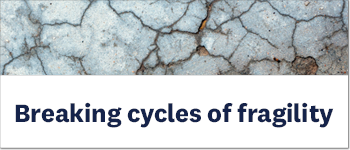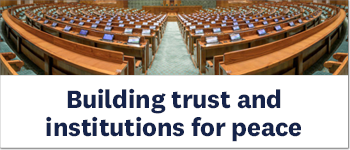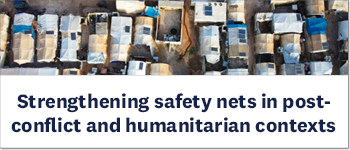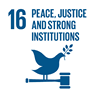Peace and stability are central to the prosperity and security of countries and their citizens. Yet, we currently have limited understanding of how and why violent conflicts persist and their legacies endure across time, what can be done to reduce renewed cycles of violence and what interventions work to ensure sustained peace and inclusive state-building trajectories in post-conflict countries.
UNU-WIDER's From conflict to cohesion – pathways for peace and inclusive statebuilding research area focuses on understanding and addressing the complex challenges of conflict-affected settings, aiming to bridge the development gap between peaceful and conflict-ridden countries.
Under this research area, we will focus on the nexus between poverty divergence, statebuilding, and economic resilience. The research, events, and dissemination inform policy actions for sustainable peace and development. By fostering dialogue and by providing evidence-based solutions, this research area seeks to promote inclusive and peaceful states, social cohesion, and resilience in post-conflict societies.
Key questions
- What is the poverty gap between conflict-affected and peaceful countries and how is this gap projected to evolve over the next 20 years?
- How can countries emerging from violent conflicts strengthen the social contract between states and citizens, as well as more cohesive and inclusive bureaucracies and institutions?
- What role can social protection policies and interventions to protect livelihoods among conflict-affected communities play in supporting sustainable and inclusive peace?
- How can international aid be better leveraged to protect the most vulnerable populations in the world?
In the 2024-27 work programme, our work on pathways for peace and inclusive statebuilding is carried out in the following projects:
Contributions to the 2024-2027 work programme cross-cutting themes
The impact of climate change on conflicts and peace will be considered in several of the research projects. It will be an important part of the Strengthening safety nets in post-conflict and humanitarian contexts project. In the Breaking cycles of fragility project a policy report will be published on climate change, displacement, and conflict.
Gender issues are at the heart of building sustainable peace and inclusive states. Conflict-affected countries suffer from high-levels of gender-based violence, inequalities and discrimination. In all projects, we will consider gender-related implications and their role in how inclusive statebuilding trajectories can be supported in post-conflict countries.
Data is an important part of the From conflict to cohesion – pathways for peace and inclusive statebuilding research area. The work in this theme will engage closely with the Households in Conflict network and other networks at the forefront of data collection in challenging, conflict-affected contexts. New research data will be collected to build a more robust knowledge base on conflicts and peace, especially from the perspective of civilians.
The United Nations’ 2030 Agenda for Sustainable Development
This project contributes towards the achievement of SDG 16 on Peace, Justice and Strong Institutions by providing new insights and evidence on the underlying drivers of poverty and conflict, the dynamics of state-building and governance, and the effectiveness of policy interventions in post-conflict contexts.

 Join the network
Join the network


